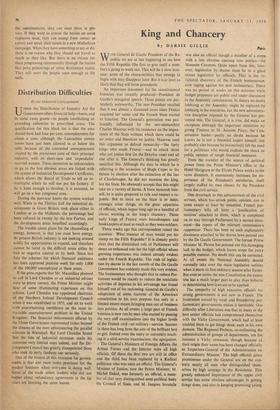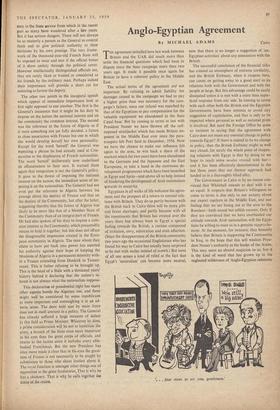King and Chancery
WITH General de Gaulle President of the Re- public we are at last beginning to see how the Fifth Republic (the first to give itself a num- ber) is going to work out. This will be a slow busi- ness; some of the characteristics that emerge to begin with may disappear later. But it is at least as likely that they will form precedents.
An important document for the constitutional historian was recently produced—President de Gaulle's inaugural speech. Three points are par- ticularly noteworthy. The new President recalled that it was almost a thousand years since France
acquired her name and the French State started to function. The General's generation was pro- foundly influenced by the neo-monarchist Charles Maurras with his insistence on the impor- tance of the State without which there could be no order and therefore no justice. Maurras used this argument to defend monarchy—`the forty kings who made France'—and to attack those who put justice first (in the Dreyfus case) and all else after it. The General's thinking has greatly modified this. Although the date to which he is referring is the accession of Hugh Capet to the throne by election after the extinction of the line of Charlemagne, he did not mention the king, but the State. He obviously accepts that this might take on a variety of forms. A born monarch him- self, he is quite prepared to rule and respect a re- public. But to insist on the State is to insist, amongst other things, on the great apparatus of officials, which began long ago as a handful of clerics working in the king's chancery. Those early kings of France were housekeepers and bookkeepers at least as much as they were soldiers.
Three weeks ago this correspondent raised the question : What manner of man would put his stamp on the Fifth Republic? It is already pretty clear that the diminished role of Parliament will mean an enhanced role for the high official whose growing importance was indeed already evident under the Fourth Republic. The rush of legisla- tion by decree in the last month of the De Gaulle Government has suddenly made this very evident. The businessman who thought that to reduce Par- liament would be mainly to reduce the socialistic activities of deputies to his advantage has found himself out of his reckoning. General de Gaulle's adaptation of some features of the American constitution to his own purpose has only to a limited extent meant bringing men out of business into politics. At all events a large part of French business is now run by men who started by passing the very stiff examinations into the higher levels of the French civil—or military—service. Success in these has long been the aim of the brilliant boy or girl. Indeed even the entry to university teach- ing is a civil-service examination, the agregation.
The General's Ministers of Foreign Affairs, the Armed Forces and the Interior were all high officials. Of these the first two are still in office and the third has been replaced by a Radical politician who was once an official. The General's Minister of Justice, now the Prime Minister, M. Michel Debra, was formerly an official, a mem- ber of that very distinguished semi-political body the Council of State, and M. Jacques Soustelle
was also an official though a member of a corps with a less obvious opening into politics—the Museum Curators. Quite apart from this, how- ever, legislation by decree must be to a great extent legislation by officials. That is the in- furiated discovery of the French businessman.
now raging against the new technocracy. There was no period of weeks on this occasion while budget proposals are public and under discussion in the Assembly commissions. In theory no doubt lobbying at the Assembly might be replaced by lobbying in the ministries, but the new administra- tive discipline imposed by the General has pre-
vented this. The General, it is true, did make an
exception amongst the important ministries by giving Finance to M. Antoine Pinay, the Con-
servative leader—partly no doubt because he knows he is not a financial expert himself, but probably also because he instinctively felt the need for a politician who would cushion the shock to public opinion of tough financial measures.
Even the transfer of the source of political power from the Prime Minister's office at the Hotel Matignon to the Elyse Palace works in the same direction. It enormously increases the im- portance of the President's secretariat, itself largely staffed by men chosen by the President from the.civil service.
One drawback to this advancement of the civil servant, which has struck public opinion, can to some extent at least be remedied. French par- liamentary bills all have a 'justification of motives' attached to them, which is completed on its way through Parliament by a second docu- ment—the report of the relevant commission's rapporteur. There has been no such explanatory document attached to the decree laws poured out by the De Gaulle Government. The former Prime Minister M. Pleven has pointed out this damaging lack to the budget, which leaves scope for every possible rumour. No doubt this can be corrected. At all events the National Assembly should normally take over the main legislative activity when it starts its first ordinary session after Easter. But even so under the new Constitution the execu- tive has a much larger part to play than hitherto in determining how laws are to be applied.
The sympathy of high executive officials for strong governments is not new in France. l'he frustration caused by weak and floundering par- liamentary governments makes it inevitable. One difficulty after Liberation was that so many of the best senior officials had compromised themselves with the Vichy Government, which had at least enabled them to get things done, each in his own domain. The Regional Prefects, co-ordinating the administration of groups of departments, are for instance a Vichy invention, though because of their origin their name has been changed officially to 'Inspectors-General of the Administration on Extraordinary Mission.' The high officials given prominence under the General are on the con- trary nearly all men who distinguished them- selves by high courage in the Resistance. This greatly enhanced importance of the upper civil service has some obvious advantages in getting things done, and also in keeping promising young men in the State service from which iri the recent past so many have wandered after a few years. But it has serious dangers. There will not always, be so masterly a person as the General to control them and to give political authority to their decisions by his own prestige. The very frame- work of the thousand-year-old French State will be exposed to wear and tear if the official bones of it show unduly through the political cover. However intellectually distinguished officials are, they are rarely liked or trusted or considered as his friends by the ordinary man. Perhaps indeed their importance will provide a short cut for restoring to favour the deputy.
The other two points in the inaugural speech which appear of immediate importance look at first sight opposed to one another. The first is the General's insistence that it might be his duty to impose on the nation the national interest and on the community the common interest. The second was the reference to the future of Algeria as if it were something not yet fully decided, a future in close association with France but one in which she would develop herself her own personality. Except for the word 'herself' the General was repeating a phrase he had already used at Con- stantine to the displeasure of French nationalists. The word 'herself' deliberately now underlined its offensiveness to their ears. It warned them again that integration is not the General's policy. It gave to the threat of imposing the national interest on the nation, the immediate sense of im- posing it on the nationalists. The General had not even put the reference to Algeria between his passage about the destiny of France and that on the destiny of the Community, but after the latter, suggesting thereby that the future of Algeria was likely to be more like that of a Member State of the Community than of an integral part of France. He had also spoken of his duty to impose a com- mon interest in the Community, which presumably means to hold it together, but this does not efface the disagreeable impression created in the Euro- pean community in Algeria. The man whom they claim to have put back into power has asserted his authority against their hope of keeping the Moslems of Algeria in a permanent minority with- in a France extending from Dunkirk to Taman- rasset. This is father refusing to be brought up. This is the head of a Stite with a thousand years' history behind it declaring that the nation's in- terest is not always what the nationalists suppose.
This declaration of presidential right has many other aspects beside the Algerian one, and these might well be considered by some republicans as more important and outweighing it in an ad- verse sense. The door held ajar by main force does not in itself amount to a policy. The General has already suffered a large measure of defeat in this field as Prime Minister. Whatever he does, a prime consideration will be not to humiliate the army, a branch of the State even more important in, his eyes than the great corps of officials, and nearer to the nation since it includes every able- bodied Frenchman. But the new President has once more made it clear that in his eyes the great- ness of France is not necessarily to be sought by submision to those who shout loudest about it. The royal function is amongst other' things one of opposition to the great feudatories, That is why he has a chancery. That is why he calls together the states of the realm.











































 Previous page
Previous page